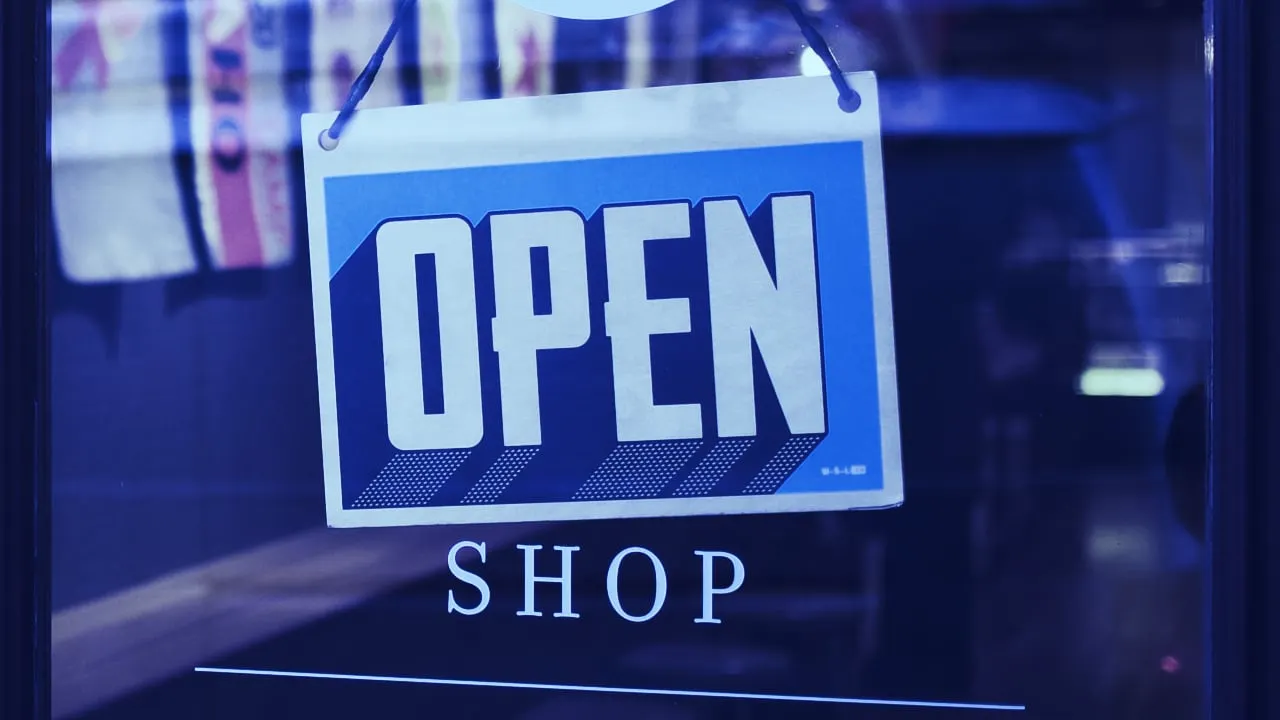Es fácil, es rápida, es inteligente.
Una tarjeta como la de toda la vida… pero en criptomonedas.
¿Todavía no tienes la tuya?
Entra, regístrate y solicítala en https://t.co/DTzGMPO1bO
Te llegará directamente a la dirección que tú nos indiques, vía encomienda. pic.twitter.com/MIhN88pvhR
— Criptolago (@criptolago) September 30, 2019
Coin Prices
BTC
$66,942.00
-2.30%ETH
$1,992.65
-3.50%XRP
$1.40
-4.13%BNB
$618.15
-1.38%USDC
$1.00
0.01%SOL
$85.27
-3.10%TRX
$0.285233
0.14%DOGE
$0.096465
-6.03%FIGR_HELOC
$1.032
-0.18%WBT
$50.02
-2.06%ADA
$0.285533
-3.44%USDS
$0.999871
-0.01%BCH
$482.35
-6.14%LEO
$8.73
-0.46%HYPE
$28.32
-0.39%CC
$0.169025
2.45%LINK
$8.95
-5.32%XMR
$338.14
-0.24%USDE
$0.99937
-0.04%XLM
$0.15938
-3.07%USD1
$0.99928
-0.07%RAIN
$0.00934877
-1.65%HBAR
$0.100076
-2.14%LTC
$54.91
-5.34%PYUSD
$1.00
0.03%ZEC
$239.15
-5.78%AVAX
$9.16
-5.91%SUI
$0.916863
-5.12%SHIB
$0.00000596
-6.59%WLFI
$0.115801
-2.82%CRO
$0.076343
-3.93%TON
$1.27
-4.36%XAUT
$5,165.77
-0.50%DOT
$1.55
1.46%PAXG
$5,199.14
-0.46%M
$1.42
2.81%UNI
$3.76
-6.71%MNT
$0.635506
1.64%BUIDL
$1.00
0.00%USYC
$1.12
0.01%USDF
$0.99734
-0.07%AAVE
$114.14
-6.53%TAO
$178.81
-1.90%ASTER
$0.693577
-3.54%USDG
$1.00
0.02%OKB
$76.88
-1.50%PEPE
$0.00000383
-10.89%SKY
$0.068851
-0.87%RLUSD
$0.999633
-0.01%BGB
$2.23
-0.76%PI
$0.165553
-3.43%HTX
$0.00000161
-2.43%NEAR
$1.095
-3.86%ETC
$8.73
-6.11%BFUSD
$0.999394
0.00%ICP
$2.35
-1.01%ONDO
$0.261319
-5.55%POL
$0.109484
-5.57%GT
$7.03
-1.78%USTB
$11.00
0.01%WLD
$0.393249
-5.84%KCS
$8.48
-4.44%PUMP
$0.00175859
-7.96%MORPHO
$1.82
-3.25%NIGHT
$0.059263
2.52%HASH
$0.01660966
-3.86%QNT
$63.09
-4.08%ATOM
$1.84
-11.68%PIPPIN
$0.862159
12.50%ENA
$0.104381
-3.51%NEXO
$0.843282
-3.89%KAS
$0.03143815
-0.58%USDTB
$0.999895
0.27%FLR
$0.00947854
-2.59%EUTBL
$1.23
-0.19%TRUMP
$3.43
-4.55%ALGO
$0.087798
-4.70%USDD
$1.00
-0.03%OUSG
$114.41
0.01%FIL
$0.990368
-7.83%APT
$0.939845
-5.27%RENDER
$1.41
-6.73%STABLE
$0.03389703
10.77%JAAA
$1.027
0.01%USDY
$1.12
1.15%XDC
$0.03517737
1.25%VET
$0.00745995
-5.20%BDX
$0.0803
-0.30%JTRSY
$1.096
0.00%USD0
$0.998092
-0.04%ARB
$0.096723
-5.38%JUP
$0.151892
-4.44%BONK
$0.00000603
-7.98%GHO
$1.00
-0.01%DCR
$30.66
9.13%A7A5
$0.01293037
0.37%TUSD
$0.998842
-0.07%FTN
$1.087
-0.08%KITE
$0.263806
-1.59%STX
$0.25663
-3.64%SEI
$0.0695
-3.08%EURC
$1.18
-0.10%USDAI
$0.999839
-0.02%VIRTUAL
$0.665979
-5.02%DASH
$34.09
-3.69%PENGU
$0.00681775
-7.16%CAKE
$1.29
-3.09%JST
$0.04694317
7.00%XTZ
$0.385288
-2.63%KAU
$166.49
-0.58%POWER
$1.83
89.86%FDUSD
$1.00
-0.11%ETHFI
$0.501237
-5.49%CRV
$0.247101
-3.85%FET
$0.159323
-5.88%CTM
$0.082171
-2.43%LIT
$1.43
-3.50%USX
$0.99969
-0.01%BTT
$0.00000035
2.43%IP
$0.974918
-8.42%PRIME
$1.02
0.03%GNO
$127.56
-2.59%NFT
$0.00000033
-0.13%CHZ
$0.03182221
-10.01%AERO
$0.353827
-1.20%KAIA
$0.05566
-1.49%BSV
$15.99
-4.16%ADI
$3.24
1.02%INJ
$3.13
-5.77%SUN
$0.01617086
-2.20%ZRO
$1.51
-4.60%PYTH
$0.051216
-6.38%TIA
$0.331427
-11.82%IOTA
$0.068095
-4.48%CRVUSD
$0.999554
0.36%JASMY
$0.005848
-3.63%SPX
$0.304999
-6.06%GRT
$0.02633442
-6.61%FLOKI
$0.00002863
-7.62%FRAX
$0.991219
0.03%OHM
$17.39
-0.63%SYRUP
$0.234836
2.16%LDO
$0.308742
-6.40%2Z
$0.075746
0.11%HNT
$1.39
-3.24%BTSE
$1.59
-1.45%CFX
$0.04948255
-6.83%SIREN
$0.339484
2.34%OP
$0.118124
-6.18%TEL
$0.00256466
-7.49%AB
$0.00244371
-1.99%ENS
$6.22
-5.98%STRK
$0.04246345
-7.25%UDS
$1.84
3.28%NUSD
$0.99891
0.12%AXS
$1.33
-2.70%MON
$0.02087387
-5.06%SAND
$0.083078
-5.69%YLDS
$0.999995
-0.00%RIVER
$11.50
24.10%USDA
$0.984733
-0.39%AUSD
$1.00
0.02%USTBL
$1.075
0.01%XPL
$0.094091
-4.47%PENDLE
$1.28
-1.59%BCAP
$22.79
0.00%APEPE
$0.00000098
2.40%WIF
$0.205583
-5.05%FT
$0.099452
-0.18%ZBCN
$0.00206718
-6.90%TWT
$0.481639
-7.11%TIBBIR
$0.198552
3.12%LUNC
$0.00003588
-2.03%ULTIMA
$5,136.96
-3.65%NEO
$2.74
-2.81%BARD
$0.853553
10.81%VSN
$0.053233
-1.27%BORG
$0.194923
-5.50%PC0000031
$1.00
0.00%THETA
$0.188988
-4.58%FF
$0.078879
-1.16%MANA
$0.094565
-5.38%H
$0.097886
-25.33%XCN
$0.00484403
-2.89%FDIT
$1.00
0.00%VVV
$4.07
-5.83%COMP
$18.44
-2.47%ZK
$0.01918698
-6.56%IUSD
$1.00
0.25%GALA
$0.00364193
-4.34%SENT
$0.02348045
1.16%BAT
$0.112065
-11.22%REAL
$0.053288
-2.99%9BIT
$0.02017834
0.84%MX
$1.79
-0.40%WFI
$2.05
-6.50%FARTCOIN
$0.163885
-3.42%CVX
$1.78
-10.28%KOGE
$48.00
-0.01%RAY
$0.605857
-7.43%FLUID
$2.05
-4.85%SATUSD
$0.994882
12.33%EURS
$1.25
-0.41%DEXE
$3.30
-4.39%XEC
$0.00000773
-3.44%S
$0.04002377
-9.51%GUSD
$1.002
0.09%USDF
$0.998275
-0.02%TRAC
$0.321777
-2.42%THBILL
$1.012
-0.13%WEMIX
$0.304089
-0.33%RUNE
$0.400954
-4.62%GLM
$0.140035
-9.21%IMX
$0.164691
-7.98%B
$0.137104
-3.58%0G
$0.638514
-5.07%COCO
$0.132005
0.42%1INCH
$0.093565
-4.02%ACRED
$1,096.62
-0.04%BERA
$0.607103
-4.44%EGLD
$4.44
-5.07%RLB
$0.073773
-1.00%A
$0.079443
-5.89%SFP
$0.255515
-4.09%GOMINING
$0.312103
-2.36%OZO
$0.130201
-0.88%LION
$0.00400959
-2.07%COW
$0.218563
-3.39%AMP
$0.00145138
-3.69%KTA
$0.24666
-8.95%WAL
$0.075239
-5.71%SKR
$0.02105683
-10.55%JTO
$0.274514
-7.65%PUSD
$1.001
0.00%QRL
$1.53
5.29%SNX
$0.348714
-7.63%GRX
$12.50
8.57%DOLA
$0.995454
-0.01%LPT
$2.31
-4.09%EIGEN
$0.190225
-6.14%MWC
$11.46
-2.41%ONYC
$1.079
-0.07%BAN
$0.113894
-3.34%FRXUSD
$1.00
0.09%REUSD
$1.063
0.06%BMX
$0.331499
-3.58%CUSD
$1.006
0.66%CASH
$0.999638
-0.02%
